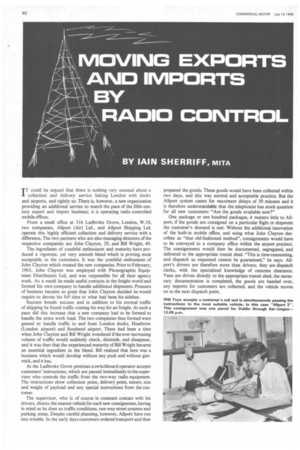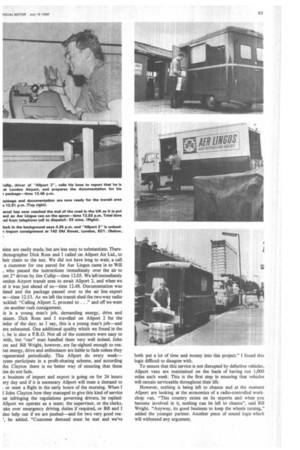MOVING EXPORTS AND IMPORTS BY RADIO CONTROL
Page 64

Page 65

If you've noticed an error in this article please click here to report it so we can fix it.
TT could be argued that there is nothing very unusual about a collection and delivery service linking London with docks and airports, and rightly so. There is, however, a new organization providing an additional service to match the pace of the 20th-century export and import business; it is operating radio controlled mobile offices.
From a small office at 316 Ladbroke Grove, London, W.10, two companies, Allport (Air) Ltd., and Allport Shipping Ltd. operate this highly efficient collection and delivery service with a difference. The two partners who are also managing directors of the respective companies are John Clayton, 29, and Bill Wright, 49.
The ingredients of youthful enthusiasm and maturity have produced a vigorous, yet very smooth blend which is proving most acceptable to the customers. It was the youthful enthusiasm of John Clayton which created the new companies. Prior to February, 1965, John Clayton was employed with Phonographic Equipment Distributors Ltd, and was responsible for all their agency work. As a result he made useful contacts in the freight world and formed his own company to handle additional shipments. Pressure of business became so great that John Clayton decided he would require to devote his full time to what had been his sideline.
Success breeds success and in addition to his normal traffic of shipping he found traffic coming his way for air freight. At such a pace did this increase that a new company had to be formed to handle the extra work load. The two companies thus formed were geared to handle traffic to and from London docks, Heathrow (London airport) and Southend airport. There had been a time when John Clayton and Bill Wright wondered if the ever-increasing volume of traffic would suddenly check, diminish, and disappear, and it was then that the experienced maturity of Bill Wright became an essential ingredient in the blend. Bill realized that here was a business which would develop without any push and without gimmick, and it has.
At the Ladbroke Grove premises a switchboard operator accepts customers' instructions, which are passed immediately to the supervisor who controls the traffic from the two-way radio equipment. The instructions show collection point, delivery point, nature, size and weight of payload and any special instructions from the customer.
The supervisor, who is of course in constant contact with his drivers, directs the nearest vehicle for each new consignment, having in mind as he does so traffic conditions, one-way street systems and parking areas. Despite careful planning, however, Allport have run into trouble. In the early days customers ordered transport and then
prepared the goods. These goods would have been collected within two days. and this was normal and acceptable practice. But the Allport system caters for maximum delays of 30 minutes and it is therefore understandable that the telephonist has stock question for all new customers: "Are the goods available now?"
One package or one hundred packages, it matters little to Allport; if the goods are consigned on a particular flight or shipment the customer's demand is met. Without the additional innovation of the built-in mobile office, and using what John Clayton describes as "that old-fashioned method", consignments would have to be conveyed to a company office within the airport precinct. The consignments would then be documented, segregated, and delivered to the appropriate transit shed. "This is time-consuming, and dispatch as requested cannot be guaranteed," he says. Allport's drivers are therefore more than drivers; they are dispatch clerks, with the specialized knowledge of customs clearance. Vans are driven directly to the appropriate transit shed, the necessary documentation is completed, the goods are handed over, any imports for customers are collected, and the vehicle moves on to the next dispatch point.
aims are easily made, but are less easy to substantiate. ThereThotographer Dick Ross and I called on Allport Air Ltd., to heir claim to the test. We did not have long to wait; a call a customer for one parcel for Aer Lingus came in to Will , who passed the instructions immediately over the air to ort 2" driven by Jim Cullip—time 12.05. We left immediately ondon Airport transit area to await Allport 2, and when we :c1 it was just ahead of us—time 12.48. Documentation was deted and the package passed over to the air line export in—time 12.53. As we left the transit shed the two-way radio .ackled: "Calling Allport 2, proceed to. . ." and off we went on another rush consignment.
IS is a young man's job, demanding energy, drive and Lsiasm. Dick Ross and 1 travelled on Allport 2 for the inder of the day; as I say, this is a young man's job—and ere exhausted. One additional quality which we found in the r, he is also a P.R.O. Not all of the customers were easy to with, but "our" man handled them very well indeed. John on and Bill Wright, however, are far-sighted enough to reahat energy, drive and enthusiasm are liable to fade unless they regenerated periodically. This Allport do every week— )CCs participate in a profit-sharing scheme, and according ihn Clayton there is no better way of ensuring that these ties do not fade.
Le business of import and export is going on for 24 hours ery day and if it is necessary Allport will meet a demand to or meet a flight in the early hours of the morning. When I I John Clayton how they managed to give this kind of service iut infringing the regulations governing drivers, he replied: Allport we operate as a team; the supervisor, or the clerks, ,ake over emergency driving duties if required, or Bill and I ilso help out if we are pushed—and for two very good rea', he added. "Customer demand must be met and we've both put a lot of time and money into this project." E found this logic difficult to disagree with.
To ensure that this service is not disrupted by defective vehicles, Allport vans are maintained on the basis of having run 1.000 miles each week. This is the first step in ensuring that vehicles will remain serviceable throughout their life.
However, nothing is being left to chance and at the moment Allport are looking at the economics of a radio-controlled workshop van. "This country exists on its exports and when you become involved in it, nothing can be left to chance", said Bill Wright. "Anyway, its good business to keep the wheels turning." added the younger partner. Another piece of sound logic which will withstand any argument.
























































































































